| Reports of visits to Japan of POWs |
Friendship Meeting
between American ex-POWs and Japanese Citizens
| Mr. Jim Collier | Mr. Harry Corre | Mr. Ralph E. Griffith | Question and Answer |
7 Former US POWs and their family members visited Japan from 17 to 23 October 2011. It was the second visiting group on the invitation of the Japanese Government. >>Jump
Mr. Robert J. Vogler |
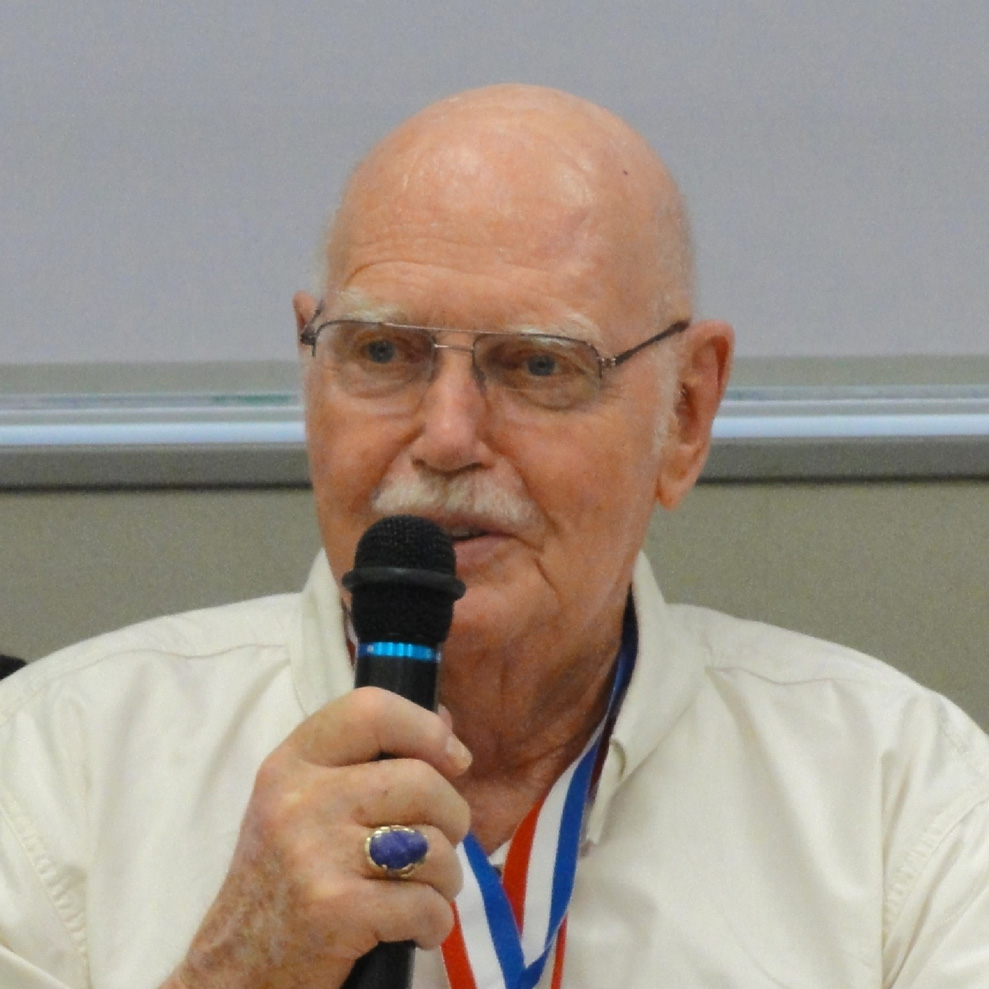 |
Konnichiwa. We've been having a wonderful time and we thank the people of Japan and the government for all the wonderful things they've been doing for us. They've kept us very busy and they showed us a different side where we can look in. Friendship is something else. We started here with our hopes, our dreams, our freedom, and friendship finally was realized. We wonder sometimes what the word "friendship" means. You showed us, for sure, what friendship means. Thank you very kindly.
My home is in San Diego, California, I'm 6 foot 2 (inches), 210 pounds and 90 years old. I completed a military career and also an engineering career, and have been retired for about 30 years, I guess. Quite briefly, the war situation: I was on Bataan, I made the infamous Bataan Death March, and I was transported by ship, then I was sent to Mukden, in Manchuria - Manchukuo - you have a different name for it. I was considered uncooperative. I didn't obey the rules too well, so I was transferred to Kamioka, Japan to the lead mines. And there, it was work. "Shigoto takusan." I established a nice friendship with a guard there, and we have maintained this friendship through his family for the last 45 years, I guess. His name is Masaru Okada. And yesterday, his No.1 son ("ichiban") and his wife - we had a chance to visit with them as part of our tour. So that was my thrill. I've been back to Japan about five times now. Once to Kamioka, quite a fanfare, with the mayor of San Diego, and all the fanfare, and everybody treated us wonderfully. This was after having a Japanese student for several weeks in the States. We became a temporary father and mother, and the song of my heart. This pretty well concludes it. The rest of it has been fine. Little by little, my heart is changing. Thank you.
Mr. Oscar Leonard |
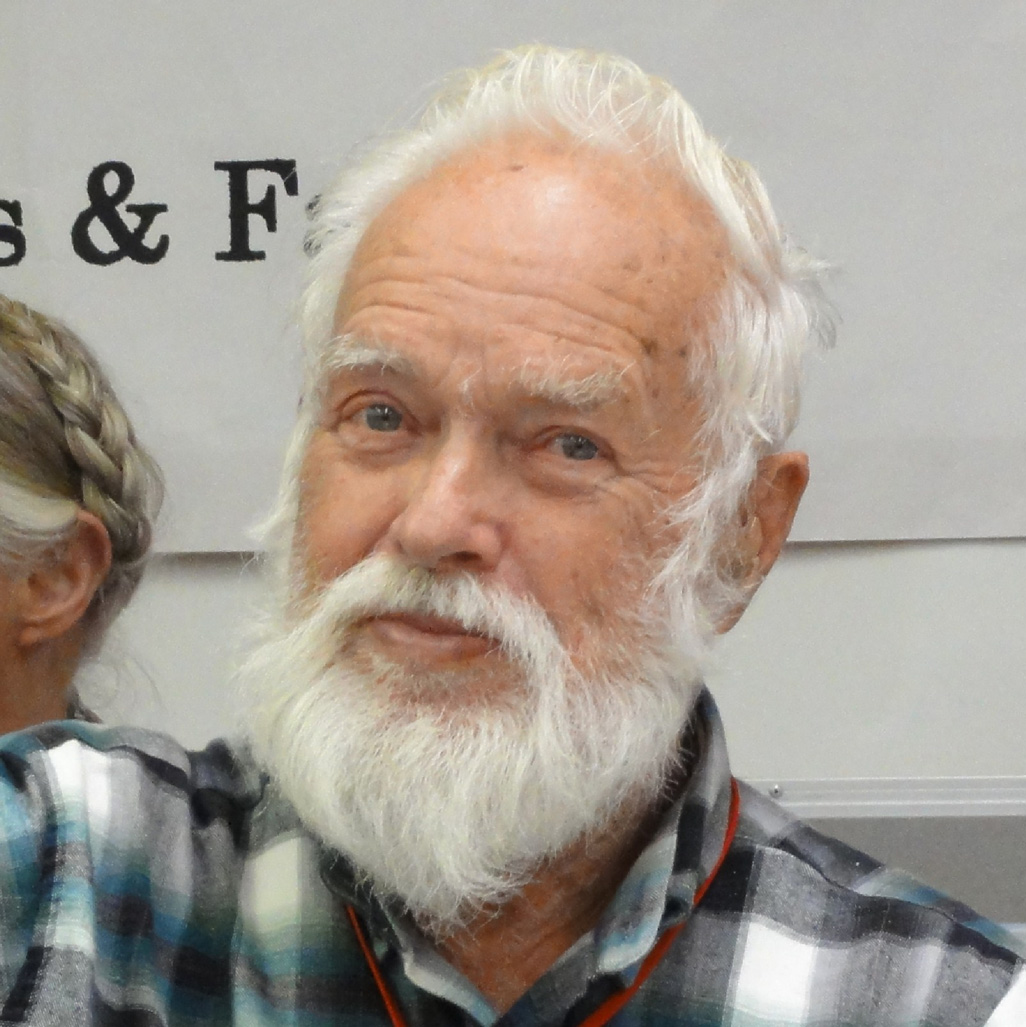 |
Bob Vogler expressed my sentiments when he said, well, freedom called. I was directly under Major-General Sharp in Mindanao and after the fall of Bataan and Corregidor, I was in the guerillas for about a month, and when he got his instructions and turned it in, I was ordered to surrender. General Sharp was not going to surrender until he was ordered directly to surrender. I was on one of the first hellships out of Manila, on the Tottori Maru, and 42 days the trip lasted from Manila to Osaka. I got on a train in Osaka and went to Kawasaki. I spent most of my time in Kawasaki. I worked for Mitsui, Mitsubishi, Showa Denko - those were all bombed out, and the finally towards the end of the war, in fact in July, I was among 100 men that were sent to Hitachi, the copper mine and refinery. That was on July 1st. and on July 22nd that camp was bombed and we lost 22 POWs. After the Emperor's speech and the Japanese surrendered, a special agent came into the camp on the 2nd of September and took me in. I was one of the few prisoners on the Missouri when the Peace Treaty was signed. From there I gradually got back to the United States. I had been in pre-med before I decided to serve in the Army, and after the time I had spent in the service I decided I couldn't go through all the education needed that I had to do, so I took up Pharmacy. I still work with a pharmacy at 92 years old.
Mr. Harold A. Bergbower |
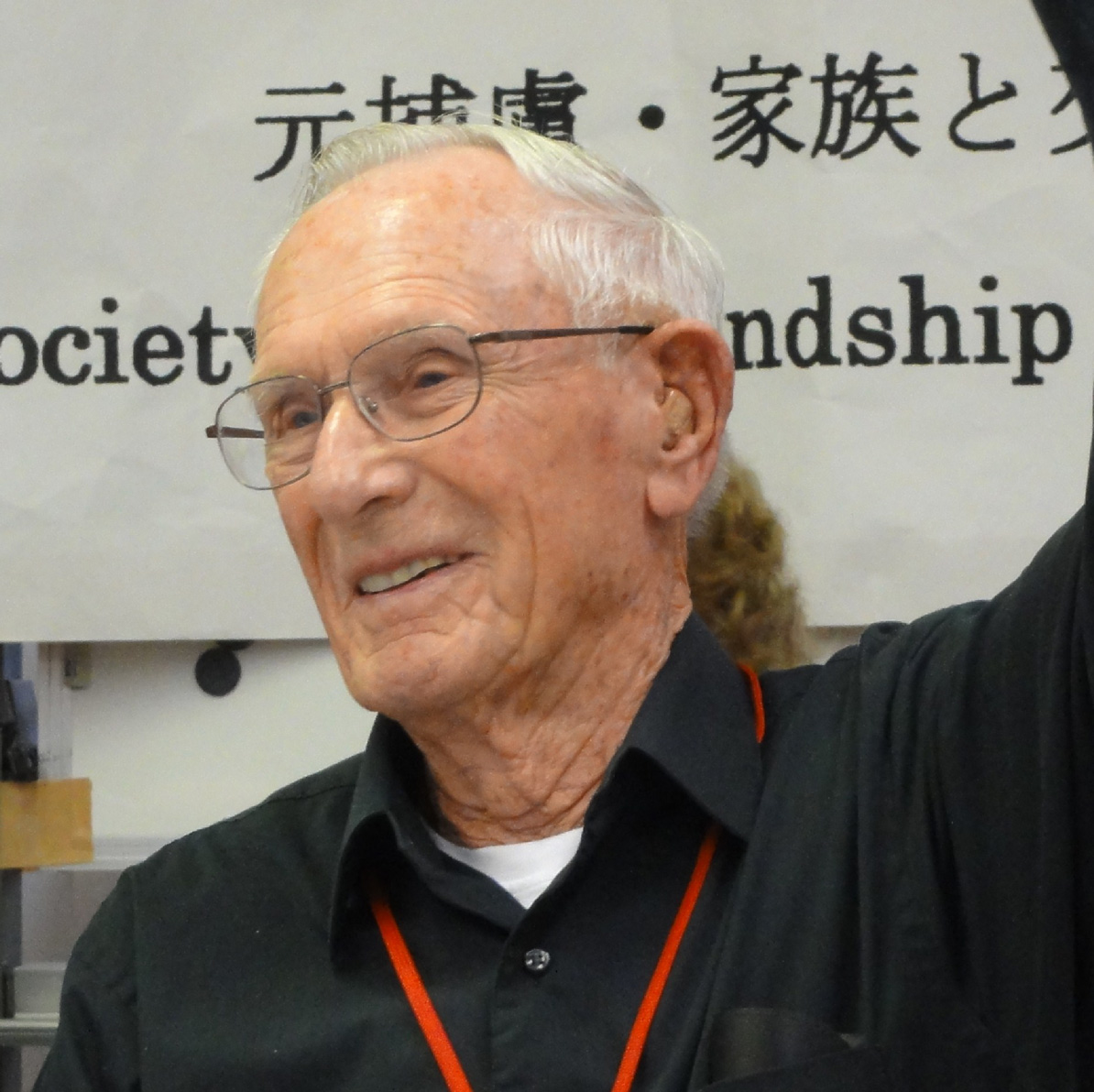 |
My name is Harold Bergbower, I live in Peoria, Arizona, which is just outside the city of Phoenix. I served in the military from 1939 to 1969 and arrived in the Philippines in 1940. I made three flights in a Martin B-10 during the war, fought two and a half months on horseback with the Philippine Scouts, and was captured on the island of Mindanao. I served in the Philippines - I was in four different prison camps, POW camps, and I was sent to Japan, to Nagoya camp No.6, which is near Toyama. In Japan, we worked for the Japan Metal Company in Toyama. We met with them last Tuesday, and they were very gracious for what we did in their camp. And one thing I want to say about the ladies in Toyama. They used to signal you and would point you to an area when you needed food, so we would pick it up afterwards. They were very gracious./p>
This trip has opened my eyes to the Japanese people. They were very gracious and the Japan Metal Company treated us very good. I hope this program will last for many years from now.
Mr. Roy E. Friese |
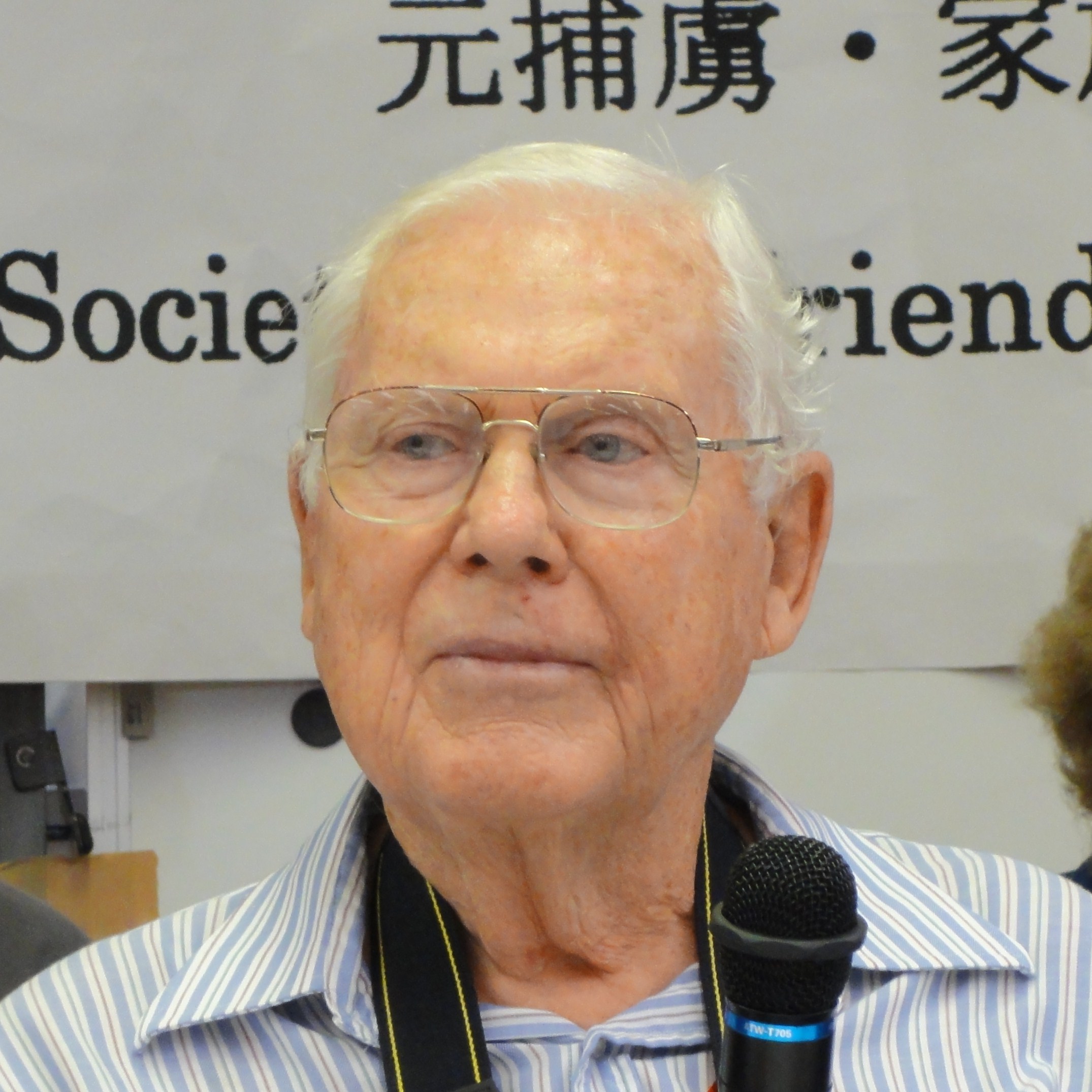 |
My name is Edward Friese and I was born in 1923 in Seattle, Washington, and shipped straight to the Philippines, I thought it was going to be a tropical vacation until December 7th. I spent a year and a half in Philippines prison camps, was shipped to Japan with a group of 500 in a room about a bit smaller than this in the hold of a ship to Moji and then from there by train to Camp 17, Fukuoka 17 and was introduced to coal mine work. After two years of coal mining surrender came, and I eventually went back to the States. I have always had resentment because of the treatment we had at Fukuoka 17. I was greatly surprised by the reception there. I thought that it was set up for a movie star, with all the paparazzi. The people there were so gracious and welcoming that I just could not imagine being treated like that after the former trip there. I really have had a great change of heart about the whole situation. I have had a very good time here. I've been pretty harried because of the tight schedule, but enjoyed every minute very much. Thank you for all being supportive.
Mr. Jim Collier |
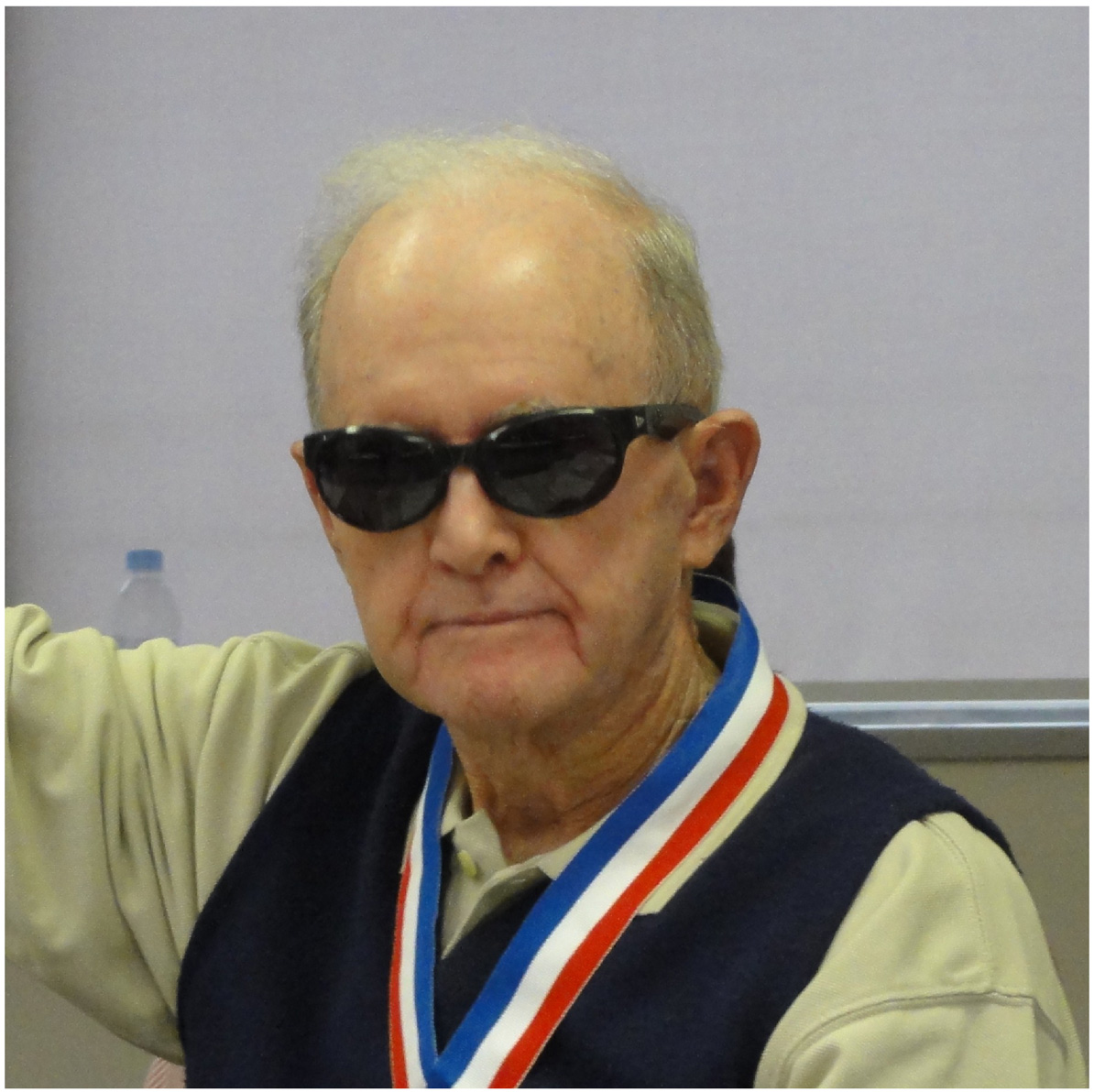 |
I'm James Collier. I'm a retired teacher and guidance counselor from Salinas, California, the salad bowl of the world - I'll do a little commercial here - and I'm very happy to be here. I had many mixed feelings, great and little, about taking this trip. I didn't know what or how I would feel. But I'm very glad I came. I believe I'm the baby of the bunch here because I'm only 88 years old. I was shipped to the Philippines in July of 1940, so I was already in the military one and a half years before Pearl Harbor. I was on Corregidor, they say, as a gunner on 12 inch naval guns. Our mission on Corregidor was to prevent the Japanese Navy from coming in through Manila Bay and we succeeded in that until Bataan fell and we had to give up the island. After Corregidor I was shipped to Cabanatuan prison camp No 3 and there we were fed watery rice and onion water. For some reason, the Japanese only had sacks of onions. So they boiled them, and they were just shreds of onion in clear water, and Americans did not know how to cook rice so the rice was not very palatable. This is significant because if you got malaria you lost your appetite, and the food was unpalatable anyway, so it created a bad situation. At that point many men started going downhill, I think. After Cabanatuan I spent some time in Carchio blasting what is called revetments to keep the Japanese planes safe from bombing. From there, on August 25th 1944, we shipped out on a ship called Noto Maru to Japan and landed in Moji, went on the Inland Sea, slept on the cobblestones of Osaka one night - very hard on the back, the cobblestones, and the next day, went to Takaoka where we worked at Nomachi Kojo, which is now a different company called Japan Metal and Chemical. Our mantra…there is a saying we had in the camp, "Shigoto takusan, meshi sukoshi." Always the same complaint. We told a Japanese Gunso one night, we said that to him, and he said, "Ah, appetite is barometer of good health." But no food!
I will say two more things, again. One was, we worked…I was in the same camp with Mr. Bergbower…we worked 14 days on, one day off, sun-up to sunset, no recreation, no diversion, just a steady, steady assault on the senses for a little over one year - September ‘44 to September '45, when we were freed. I will finish now with a comment that, for many, many years, I would be introduced somewhere, at a party, at a social gathering, and somebody would say that Mr. Collier was a guest of the Emperor. I think it's such a tremendous irony that now we truly are guests of the Emperor.
Mr. Harry Corre |
 |
My names is Harry Corre. I was captured on Corregidor with the others, and civilians and our superior officers and was taken into Cabanatuan with the rest of the POWs and stayed there for two years. During the time I was there, the POWs were dying in greater numbers every month, to the point where they were dying, and we were burying them at approximately 50 to 60 a day. I was there for two years then was shipped to Japan. After two years in the Philippines prison camps, I was sent to Omuta with this other gentleman here to work in the coal mine. In the coal mine we worked for 10 days straight, from anywhere from 10 to 14 hours a day, and the only reason we stopped on the tenth day was so that we could change shifts. There were many men who were injured very seriously in the mine in Omuta because the depth line, the lower levels of ground were flooded from the ocean, and the conditions in the mine were so poor that there were many cave-ins. I was out from two cave-ins. The last one was so bad that they couldn't send me back in the mine, so I worked on top-side cleaning the equipment etc., that they used in the mine. During this time one of the atomic bombs was dropped. After that, I was in a camp in which there was radiation fall-out from the bomb for two months, before I got repatriated and returned to the United States. When I returned to the United States, I went back to school, became an engineer, and moved from the east coast of the United States to the west coast, to Los Angeles, where I have lived now for the last 60 years. After working for 26 years in the aerospace industry as an engineer, I retired, taken up couple of other jobs and then retired again. At the present time, I work in a government hospital for what's called the Veterans' Administration, that is, for all veterans of the Navy, the Army, the Marines etc., nothing but veterans, in Los Angeles. My wife also works as a volunteer there - luckily I get paid. Along with the job at the hospital I have one other job I don't get paid for. I'm called, what is called a Service Officer for prisoners of war, the organization, and as such, I have the prisoners of war, ex-prisoners of war, former prisoners of war, they come to me if they are looking to get some kind of compensation for any of their illnesses or injuries or wounds that were received while they were soldiers. That's what I do now. The only other thing I could say is that I'm also 88 years old.
Mr. Ralph E. Griffith |
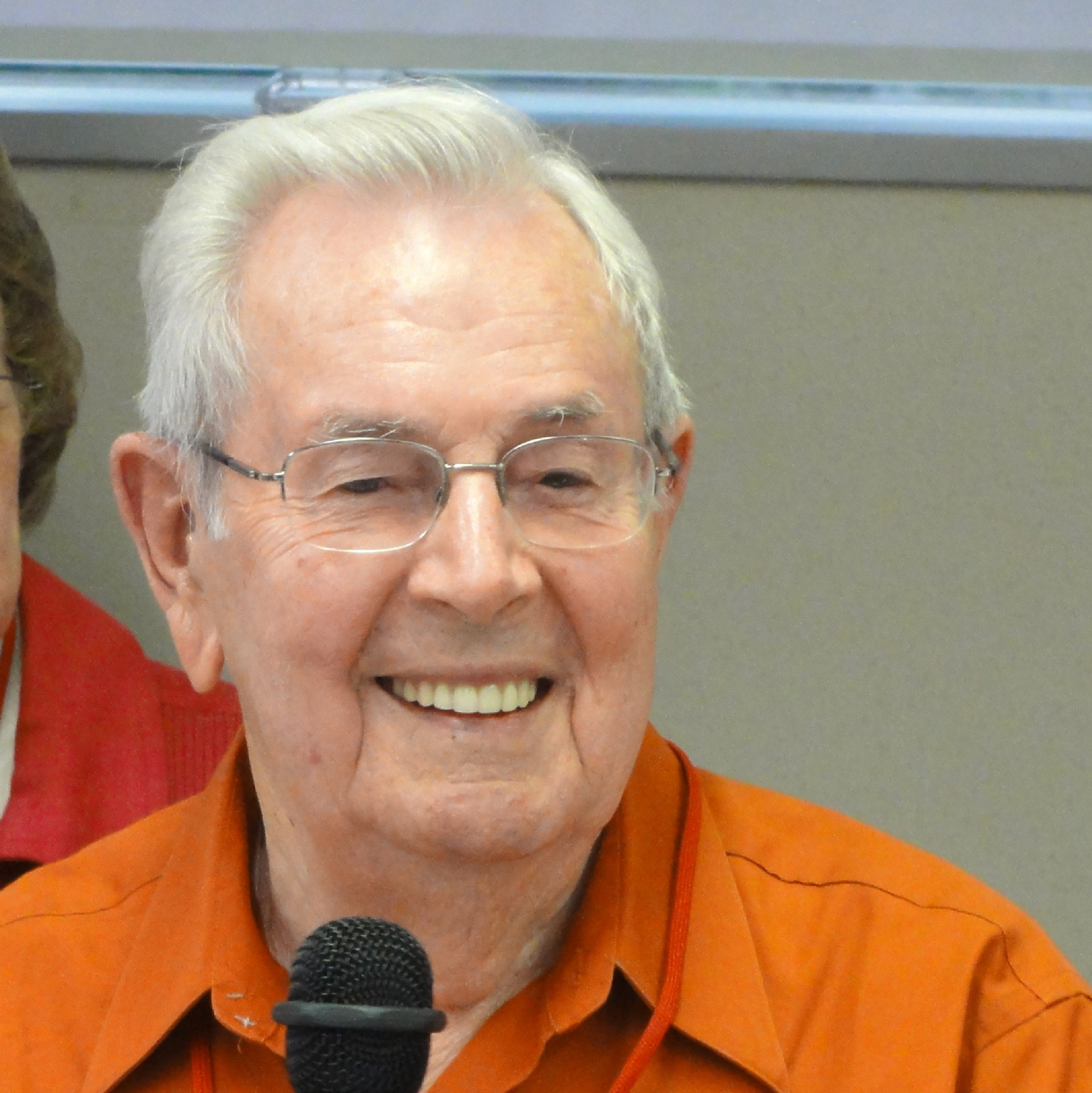 |
My name is Ralph Griffith. I'm from Hannibal, Missouri. I joined the Army when I was 17 and went straight to the Philippine islands for basic training on Corregidor with World War I equipment. But anyway, when Corregidor fell, the last island to fall, I was shipped to Bilibid prison camp, then to Cabanatuan, and was there for a couple of months. From Cabanatuan prison camp I was put on a ship, the Tottori Maru, and went to Pusan, Korea and from Pusan, Korea, we went to…sorry I got mixed up, went to Taiwan, Taipei, and a Navy sub picked us up. From there I went to Pusan, Korea. We had clothes for the tropics, so they gave us warmer clothes. We got on a train and went from Pusan to Mukden, Manchuria. I worked at a factory, called MKK Factory in Manchuria, and at the end of the war, there were eight soldiers from the United States who bailed out over Mukden (by parachute). They told the Japanese that the war was over. So the Russians came down there and freed us, and I was on my way home. I was in Mukden for maybe two months, and was put on a train by the Russians and went to Dairen. I was then put on a hospital ship to Okinawa, then from Okinawa to Manila, then on a ship that came home. And there, in that picture you have handed out, taken when I was 23 when I got home after the war, and you can see I was smiling, I can tell you. Thank you. One other thing I wanted to say is that I want to thank the Japanese government for letting us come on this trip. The people of Japan were very friendly, very polite, and I appreciate it.
Question and Answer
Q: Thank you very much for being nice to us, for saying nice things about the Japanese people. I'd like to say, "Gokurosama-deshita" in Japanese. I cannot help thinking that you had worked hard and contributed a great deal to the profit-making of these industries, Japanese, these big Japanese industries. Recently, the Korean government decided to exclude those war criminal industries from small public projects. What do you think about these things? None of you have to answer my question if you don't want to. But I really want to know how do you feel about your hard work, no payment of wages, and still those industries are not punished. They didn't pay compensation to you, also. What do you think about it?
A: I'll try to understand your question fully. We are here on a peace mission, not for a special dialog. So if you'll excuse us, we want strictly friendship. That's what we're here for. We want to continue it. Just think of it as something great. Thank you.
---
Q: Had any of you seen American sailors in POW camps? Captured from Navy ships? I'd like to present you with some information about American POWs of the Navy. Thank you.
Interpreter's comment: This is a present (a book) from him.
A: There were many. They were captured on Corregidor, on PT boats, on submarines. They also had to fight as infantry.
---
Q: I'd like to ask one thing. In the long days of your sorry situation, what supported you? What was your spirit to believe that you would come back to your country, sometime? What kept you going? What kept up your will to keep alive?
A1: Make up. We'd always make up little rhymes like, "Home alive in ‘45," "Golden Gate in '48." Some of them were boring, but we had a lot of morale-building things like that.
A2: One of the comments I remember - I was told that after we worked 20 years in the mines, we'd get a chance to go home…maybe.
A3: In Cabanatuan, of course, there was no entertainment. So we sat around at night and those fortunate enough to have cigarettes, would smoke, and we would tell stories. And there were men in the military at that time who came to the Philippines during the Spanish-American War. They were in their forties and they would tell stories about the Philippine Insurrection of 1899 after the Philippines were taken by the United States, and, just other than the harsh conditions, it was a wonderful opportunity to tell your story.
A4: The one thing you had to be - you had to be stubborn. Every day you would say, "I'm not going to die today." Just be stubborn.
A5: One of the most important things everybody could think of was food, because of the lack of food and just the fact that they always offered rice and watered onion, etc. So everybody became an expert on food. Everybody could dream about what their mothers would cook for them at home, and they all remembered those recipes. In order not to lose them, we used to have felt caps that we were issued with when we were in the service, and they used to take a magnifying glass, and with the sun and the magnifying glass, burn those recipes on their hats, or anything that they could, so that they wouldn't forget them. Because when they were going home, that's what they were going to cook.
A6: I guess one another thing that we're asked about is, what kept us going. We all came to the conclusion that we weren't going to go home. While the fighting was going on, we all were waiting for the United States to bring new supplies, which eventually we realized were not going to come. And as a result, the soldiers who were on Bataan became known as the Battling Bastards of Bataan, because there was going to be no mama, no papa. There were just going to be the Battling Bastards of Bataan. No Uncle Sam.
A7: Some people asked when we returned the United States, "How could you go that long without women?" Very easy…we didn't think about women. We thought about food.
A8: I think faith was a great part of a lot of people's survival. I know that at Cabanatuan when I thought I was about ready to die when I had all those malnutrition diseases. I prayed to God: "Please get me out of here and I'll straighten up and fly right." Then shortly after that I got a Red Cross box which saved my life.
---
Q: I joined the Army at the age of 15 for communications work and I myself was interned in Siberia, so I understand your pain, your suffering very much. I have two questions to ask. One question is, in case of the Japanese ex-POWs, they cannot talk about the truth much. They have lots of things to talk or wish to talk (about), their anger, their sorrow, their despair, their pain, but they can't talk. In your case, can you talk (about) everything? Or does the situation allow you to talk?
A1: Yes, there's no restriction.
A2: When I got discharged, I had to sign a thing written by General MacArthur, that I would not talk about any of the things that had happened to me and that I would be court-martialed if I did. So there were no books or anything written for 30 years after it happened.
---
Q: I think…I must admit Japan was an invader, invaded other countries, and you were captured by those invaders and you must have felt so humiliated, so angry and suffered a lot. Those real experiences cannot be conveyed enough to the younger generation. Your people are dying out, so what would you like to tell to the younger generation of Japan? That's what I would like to know.
A1: To answer part of your question: You were a soldier, I was a soldier. We were all soldiers. I've said this before to other members at other meetings we've gone to - every soldier from every country is an honor to that country, because he is fighting for the honor of his own homeland. So it doesn't make any difference whether you did it or we did it. I'm sure in your time a lot of people were killed or wounded…your friends, and the same goes for all of us. A war is a war. And war is, as far as I'm concerned, we can do without. As far as I'm concerned, we'd better let the politicians do the fighting, instead of the people.
A2: I was middle-aged before I knew anything about my country's history, because it's not the way it was in the high school history books. You have to learn that, and you have to go through that. But it was only during the civil rights movement in the United States that forced me to think about things, and I started reading books, and learned about African-Americans, and especially Native Americans and the Nisei and Sansei interned in the United States in World War II. That was a crime. That was against their civil rights. I'm not going to make a big polemic about it, but at least I learned something by paying attention.
---
Q: My name is Karen Smith Takizawa, I grew up in San Diego, California, and I would like to know if any of you knew my grandfather. He followed the same path that you did - Corregidor, Bilibid, Moji, Mukden. He was a medical man, Gary Miller Smith. If any of you were injured, were in the hospitals in any of those places, you might have known him. No? Well, I'm glad then, because that means you were not injured or ill. I'm very happy to see you here and I'm glad you enjoyed your trip. Thank you.